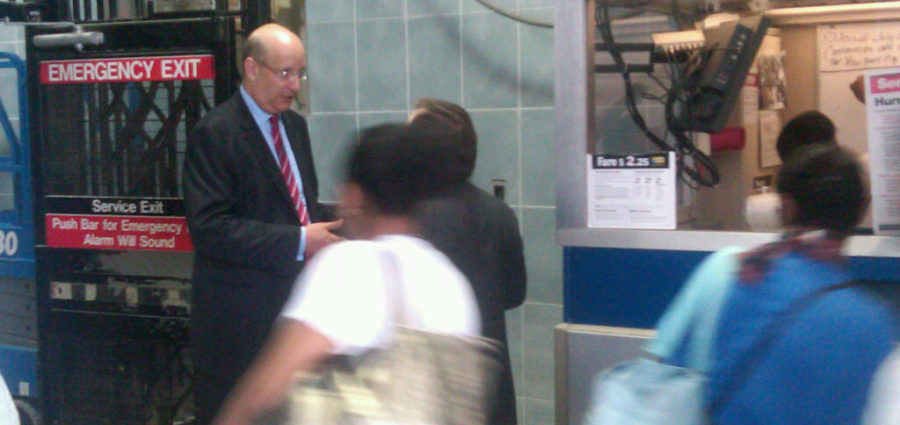Wednesday morning marked the beginning of the end for Jay Walder, the outgoing Chairman and CEO of the MTA. Yesterday, the Hong Kong-bound transit expert presided over his final MTA Board meeting, and the last part of the meeting was a veritable love-fest. Walder’s fellow board members all wished him luck in his future endeavors, and nearly all of them praised his leadership. I couldn’t help but feel that the kind words were premature.
The praise came fast and easy. “You are the best transportation operator on the planet,” Mark Lebow said. Patrick Foye echoed that praise: “At a time when public and private sector is in retrenchment, you were able to develop new initiatives that made a significant impact on the public and community.” Charles Moerdler, a fairly recent MTA appointee, praised Walder for his willingness to respond to complaints about service in his home borough of the Bronx.
The lone dissenting voice came from Norman Brown. The holdover appointee who is a strong friend of labor rightly criticized Walder for both leaving too soon and creating a strong sense of conflict between management and the authority’s labor forces. Walder, said Brown, isn’t through with the job, but he’s leaving nonetheless.
Walder himself deflected certain questions surrounding his departure. He insisted that he has a good relationship with Gov. Andrew Cuomo despite unsourced reports to the contrary, and he said that the lure of the job in Hong Kong pushed him to take it. He also spoke about any potential predecssor. “Whoever runs this organization should be dedicated to the organization,” he said. That person has to be “edicated to what it does on a day-to-day basis. I think it is helpful to have a knowledge of mass transit. I don’t know that it’s an absolutely essential quality.”
These statements seemed to be echoing sentiments from the Governor himself. “To me,” Cuomo said to Transportation Nation, “the management is very important. Of course, the technical expertise, but you give me a good manager, who can run an organization, and find efficiency, that this organization is going to have to find, that’s going to be paramount.” It sounds as though the governor wants someone who is at least as strong on leadership and creative management as they are on transit planning. That does not bode well for the TWU.
But the real question surrounding Walder’s departure is one of public effectiveness. During the meeting yesterday, one of the MTA Board members — I didn’t see who — issued some high praise: “You have left this place much better than when you came in.” That statement raised my eyebrow. I do not disagree with it, but I’m not sure the public agrees.
The MTA’s problem right now is one of external perception vs. internal reality. During Walder’s two-year tenure, the MTA has streamlined a significant portion of its operations, and it has come to embrace technological innovations while moving stalled projects forward. It’s budget is leaner than it was half a decade ago, and the agency has programs in place to realize more savings. Anyone looking at it from the inside will see improvements.
Yet, to Joe and Jane Straphanger — the folks who just want their trains to come frequently, run smoothly and have seats for them — the system isn’t really better off. Headways are longer; the bus network is becoming less reliable and convenient; the subways cost more and trains are more crowded. We’re paying more and waiting longer for less service. Does that mean the MTA is better off today than it was before Jay Walder showed up? Publicly, at least, that is a tough argument to make.
The next MTA head, whoever that may be, has his or her work cut out for them. That person will have to address a combative union, an obstinate legislature and a gaping hole in the capital budget. He or she will have to deal with rising debt costs and the desire to move the system forward. For the public, at least, “better off” might be slipping further out of hand, and the next MTA CEO will have some mighty high expectations to live up to.







